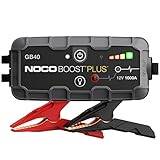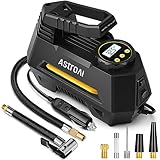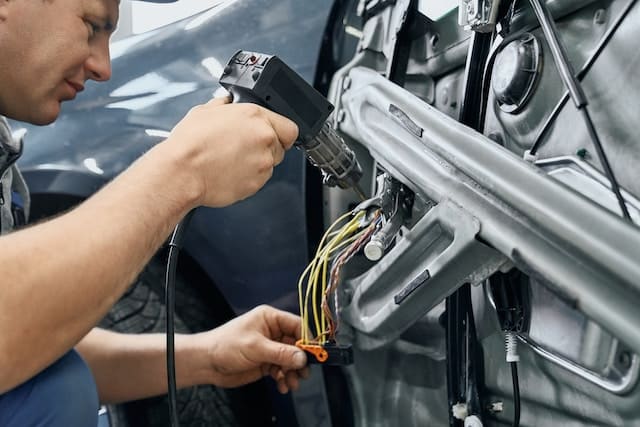
Your vehicle’s horn might be producing a weak sound due to several potential issues, such as a damaged fuse, a defective clock spring, an imperfect horn switch, a malfunctioning relay, or worn-out or compromised wiring. Further reasons could include a failing horn assembly, issues with the horn’s grounding, or even a low car battery.

The car horn is an important safety feature that allows you to alert other drivers or pedestrians of your presence. However, a weak horn can be frustrating and may not serve its intended purpose effectively. In this article, we’ll discuss the various causes of a weak car horn, what to look for, and how to diagnose and fix the problem. Read on to learn more about this common car issue and how to fix it.

Why Does My Car Horn Sound Weak? Potential Causes
Here are some potential issues explaining why does a car horn sound weak:
Blown Fuse
As car horns operate based on electrical power, a blown fuse that interrupts this power flow can result in the horn malfunctioning or emitting a subdued sound. Consequently, it’s essential to first investigate the state of the fuse if your vehicle’s horn is sounding weak.

Wiring Issues
A properly functioning horn relies heavily on well-maintained and secure wiring. Any damage, such as fraying or breakage, or a loose connection within the wiring can obstruct the electrical flow. This interruption can then result in the horn malfunctioning or producing a faint sound. Regular checks and immediate attention to any visible wire damage can help maintain the horn’s effectiveness.

Failing Horn Relay
The horn relay serves as the intermediary that channels electrical currents from the horn button to the horn itself. If this relay is failing, it could mean an inconsistent or no electrical supply to the horn, leading to a weakened sound or complete non-functionality. Regular testing of the horn relay, as part of vehicle maintenance, can help prevent this issue.
Corroded or Damaged Horn
The physical condition of the horn itself is also a critical factor. Over time, due to exposure to weather conditions or general wear and tear, the horn can become corroded or damaged. This deterioration can cause the horn to emit a diminished sound. Periodic inspection and cleaning of the horn assembly can ensure its longevity and proper performance.

Low Horn Voltage
The strength of the horn’s sound relies on sufficient voltage. If the horn is receiving a lower-than-required voltage, this can cause it to sound weak. This issue could stem from a depleted car battery or issues with the electrical system. Regular battery checks and maintenance of the vehicle’s electrical system can help prevent this problem.
Faulty Horn Switch
The horn switch, usually located within the steering wheel, is what drivers press to activate the horn. If this switch becomes faulty, it may not send the electrical signal needed to sound the horn, or it may send a weak signal, resulting in a faint horn sound.

Problematic Clock Spring
The clock spring is a coil that maintains the electrical connection to the horn as the steering wheel turns. If it’s damaged or broken, it could disrupt the electrical signal to the horn, leading to weak or intermittent horn sounds. Regular servicing can help detect and fix any clock spring issues.
Low Car Battery
If your car’s battery is low, it may not be supplying enough power to various electrical components, including the horn, resulting in a weak or feeble sound. Regular battery checks and maintenance can help ensure that the horn gets the power it needs to function correctly.

How To Diagnose And Fix A Weak Car Horn
While it’s certainly possible to undertake a DIY solution, this would necessitate a certain level of knowledge for effective diagnosis and inspection. If this task seems daunting or beyond your comfort zone, the prudent option would be to take your vehicle to the nearest automotive repair shop for professional assistance.
Checking a fuse box or attempting to repair a weak car horn requires a basic understanding of your vehicle’s electrical system. Here are some safety measures to keep in mind when performing these tasks:
- Disconnect the Battery: Always disconnect the car battery before performing any electrical work on your vehicle. This can help prevent electrical shock.
- Wear Protective Gear: Wear safety glasses to protect your eyes from sparks or debris. Using insulated tools and gloves can protect you from electrical shock.
- Use a Test Light or Multimeter: Use a test light or a multimeter to test the circuits. Never use a metal tool to test a fuse as it could cause a short circuit.
- Refer to the Owner’s Manual: Your vehicle’s owner manual will have a diagram of the fuse box indicating which fuse corresponds to the horn. Always refer to this before attempting any work.
- Replace Fuses with Correct Amperage: If a fuse needs replacing, ensure that the new fuse has the same amperage as the old one. Using a fuse with a higher amperage could cause damage to the electrical system.
- Don’t Touch Exposed Wires: Be careful not to touch exposed wires or metal parts when the battery is connected.
- Keep the Area Dry: Water is a conductor of electricity. Ensure that the area around the fuse box and the tools you are using are dry.
- Work in a Well-Ventilated Area: If you’re working in a garage, make sure it’s well-ventilated. Batteries can produce hydrogen gas, which is potentially explosive.
- Seek Professional Help if Unsure: If you’re not comfortable with the task or if the problem seems too complex, seek help from a professional mechanic. Working with electrical systems can be dangerous if not done correctly.
Remember, safety should be your primary concern when working on your vehicle. Always take necessary precautions to prevent any accidents or damage.

Check The Fuse Box

The fuse is typically located on an inside panel or under the vehicle’s hood. For precise location details, refer to the owner’s manual. The fuse’s condition is a crucial initial step in diagnosing the root cause of a feeble-sounding car horn.
Check The Horn Wiring
Visually inspect the horn wiring for any damage or looseness. If necessary, consult a repair manual or mechanic for guidance on how to fix or replace the wiring.
Test The Horn Relay
To test the horn relay, use a multimeter to check for continuity between the relay terminals. If the horn relay is faulty, it will need to be replaced.
Inspect And Clean The Horn
If the horn itself is the problem, you may need to clean or replace it. Be sure to consult a repair manual or mechanic for guidance on how to safely remove and install the horn.
Check The Horn Voltage
Use a multimeter to check the voltage at the horn. If the voltage is low, there may be an issue with the electrical system that needs to be addressed.
Generally, a car horn should last at least five to seven years. A car horn is a necessary component of vehicle safety. However, if your car horn is sounding weak or faint, it may need to be replaced sooner. If you are unsure about the condition of your car horn, it is best to have it checked out by a certified mechanic to determine if it needs to be replaced.
Car Horn Repair Or Replacement Costs

Car horn repair or replacement costs can vary widely, depending largely on the root cause of the problem and the specific make and model of your vehicle. Below are some rough estimates for various horn-related repairs:
Fuse Replacement
A blown fuse is often the most affordable issue to rectify, with replacements typically costing around $20 – $60 including labor. This repair is quick and straightforward.
Wiring Repair
If the issue lies within the wiring, such as frayed wires or loose connections, the cost can increase. You might be looking at anywhere from $100 – $300, as this job requires more skill and time to diagnose and repair.

Horn Relay Replacement
Replacing a failing horn relay can cost around $90 – $150. The part itself is not overly expensive, but the labor can add up.
Horn Switch Repair
If the problem is with the horn switch, it could be a bit costly. Depending on your vehicle model, repairs for a faulty horn switch can range from $100 to $200 for parts, with labor costs adding another $50 to $200.
Clock Spring Replacement
Fixing a broken clock spring is a more complex repair and could cost anywhere from $200 – $500, depending on the vehicle model.
Horn Replacement
If the horn assembly itself needs to be replaced, this could cost between $100 – $200 for the parts, and an additional $50 – $100 for labor.
Battery Replacement
If a weak battery is causing the horn to sound faint, you might need a new battery, which can cost between $50 and $200 plus installation.
Please note that these prices are just estimates and actual costs may vary based on the labor rates of your local garage, the exact vehicle model, and the specific nature of the issue. Always obtain a few quotes and read reviews before choosing a mechanic to ensure you’re getting fair pricing and quality work.
Possible Reasons for a Weak Car Horn Sound When Locking
If the horn on your car sounds weak or different than usual when you lock it, there could be several reasons:
- Low Battery: A weak battery can sometimes cause the horn to sound softer than usual. If your car’s battery is old or has been drained recently, it may not have enough power to operate the horn at its normal volume.
- Horn Relay: The relay could be failing or not providing the correct amount of current to the horn.
- Faulty Horn: Over time, the horn itself can wear out or become damaged, leading to a change in its sound or volume.
- Damaged or Corroded Wiring: Wiring that connects the horn or the car’s alarm system could be corroded, damaged, or loose.
- Obstruction: Something might be obstructing the horn, dampening its sound. Debris, dirt, or even a nest built by a small animal could be the culprit.
- Fuse Issue: There might be an issue with the fuse that’s linked to the horn. If the fuse is going bad or is not the correct rating, it can affect the horn’s performance.
- Programming or Feature: Some vehicles have a feature where the horn’s sound when locking the car is intentionally quieter than when the horn is used while driving. Check your vehicle’s user manual to see if this is the case.
- Ground Connection: A poor ground connection can lead to reduced horn performance.

FAQ: Why Does My Car Horn Sound Weak?

Q: What are the common reasons for my car horn sounding weak?
A: There could be several reasons for this issue, including wiring issues, a failing horn relay, a corroded or damaged horn, low horn voltage, a faulty horn switch, a problematic clock spring, or a low car battery.
Q: What role does wiring play in a car horn’s functionality?
A: The horn relies on secure and well-maintained wiring to function correctly. Any damage or loose connections can disrupt the electrical flow, leading to a malfunctioning horn or one that sounds weak.
Q: How does a failing horn relay affect the horn sound?
A: The horn relay serves as a channel for electrical currents from the horn button to the horn itself. If it fails, it could result in a weak horn sound or total non-functionality due to inconsistent or no electrical supply.
Q: Can a damaged horn produce a weak sound?
A: Yes, over time, the horn can become corroded or damaged, causing it to emit a diminished sound. Regular inspection and cleaning can help maintain its proper performance.

Q: Can a car pass inspection with a weak sounding horn?
A: It depends on the specific requirements of the vehicle inspection in your area. However, because the horn is a crucial safety feature, a malfunctioning horn could potentially cause a vehicle to fail inspection.
Q: How does low horn voltage affect the sound of the horn?
A: The horn needs sufficient voltage to sound strong. If the voltage is lower than required, the horn can sound weak. This issue could stem from a depleted car battery or issues with the vehicle’s electrical system.
Q: What is the impact of a faulty horn switch or a problematic clock spring on a car horn’s sound?
A: A faulty horn switch may not send the necessary electrical signal to sound the horn, resulting in a weak sound. Similarly, a problematic clock spring can disrupt the electrical signal to the horn, leading to weak or intermittent horn sounds.
Q: How does a low car battery influence the horn’s performance?
A: A low car battery may not supply enough power to the horn, causing it to sound weak. Regular battery checks can help ensure that the horn gets the power it needs to function correctly.
Q: Can weather conditions affect the performance of my car horn?
A: Yes, over time, exposure to harsh weather conditions can cause corrosion or damage to the horn, leading to a weak sound.
Q: Can I perform a DIY fix if my car horn sounds weak?
A: Yes, provided you have a certain level of knowledge for effective diagnosis and repair. However, if you’re not comfortable with this task, it’s recommended to seek professional help.
Q: Where can I find the car horn fuse, and how can I check its condition?
A: The car horn fuse is typically located on a panel inside the car or under the hood. You can refer to your vehicle’s owner manual for the precise location. If the fuse is blown, it will need to be replaced.
Q: How frequently should I perform checks on the horn and its related components?
A: Regular checks as part of your vehicle’s routine maintenance can help prevent issues. If you start noticing any changes in the sound of your horn, immediate attention is necessary.
Q: Is there a specific sound a failing car horn makes?
A: While it varies, a failing car horn often produces a weaker or more subdued sound than usual. In some cases, it may also produce inconsistent or intermittent sounds.
Q: Can a weak car horn sound affect my vehicle’s safety?
A: Yes, a car horn is a crucial safety feature used to alert other drivers or pedestrians. If it’s weak, it might not be heard, potentially leading to unsafe situations.
Q: How can I ensure the longevity of my car horn?
A: Regular inspections, cleaning, and maintenance can help ensure the longevity and proper performance of your car horn. This includes checking the wiring, fuse, relay, switch, clock spring, and battery.


